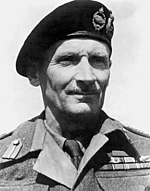How to Pronounce Bernard Montgomery
#50
Most Popular
Boost
Nov 17, 1887 London Died on 24 Mar 1976 (aged 88)
British Army officer, Commander of Allied forces at the Battle of El Alamein
ScorpioBernard Montgomery, Date of Birth, Place of Birth, Family, Facts, Age, Net Worth, Biography and More in FamedBorn.com

British Army officer, Commander of Allied forces at the Battle of El Alamein
Scorpio